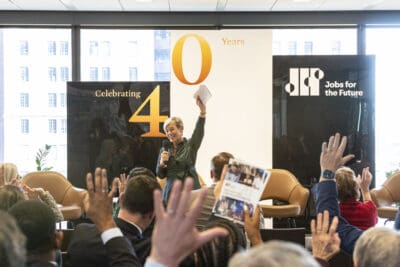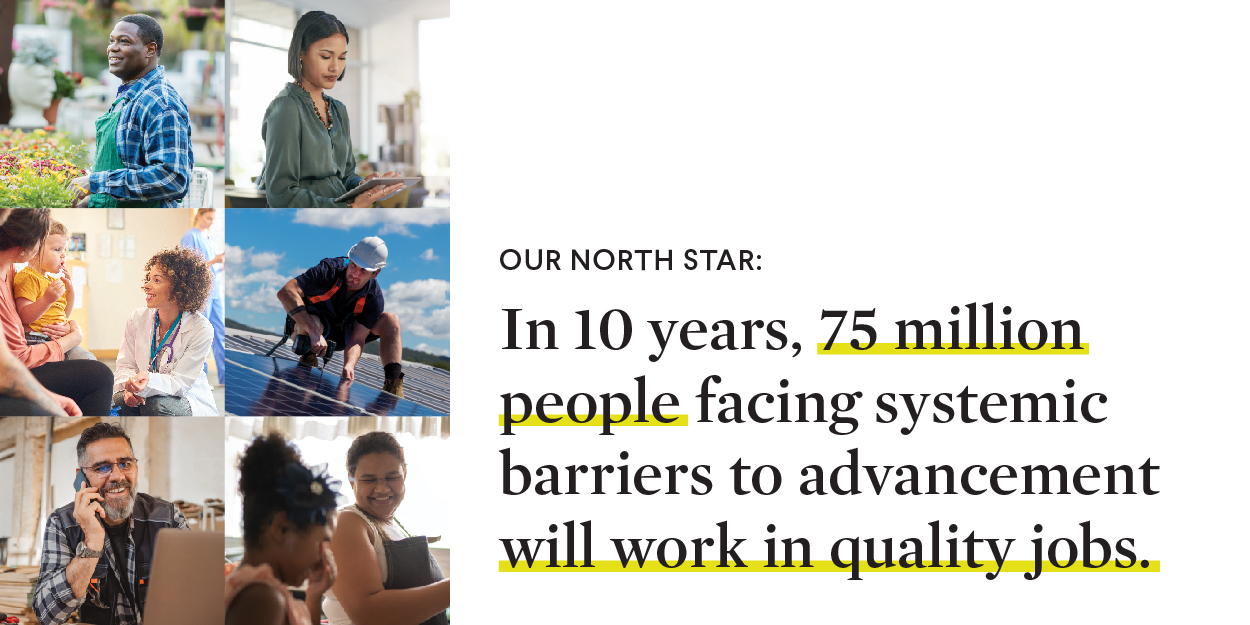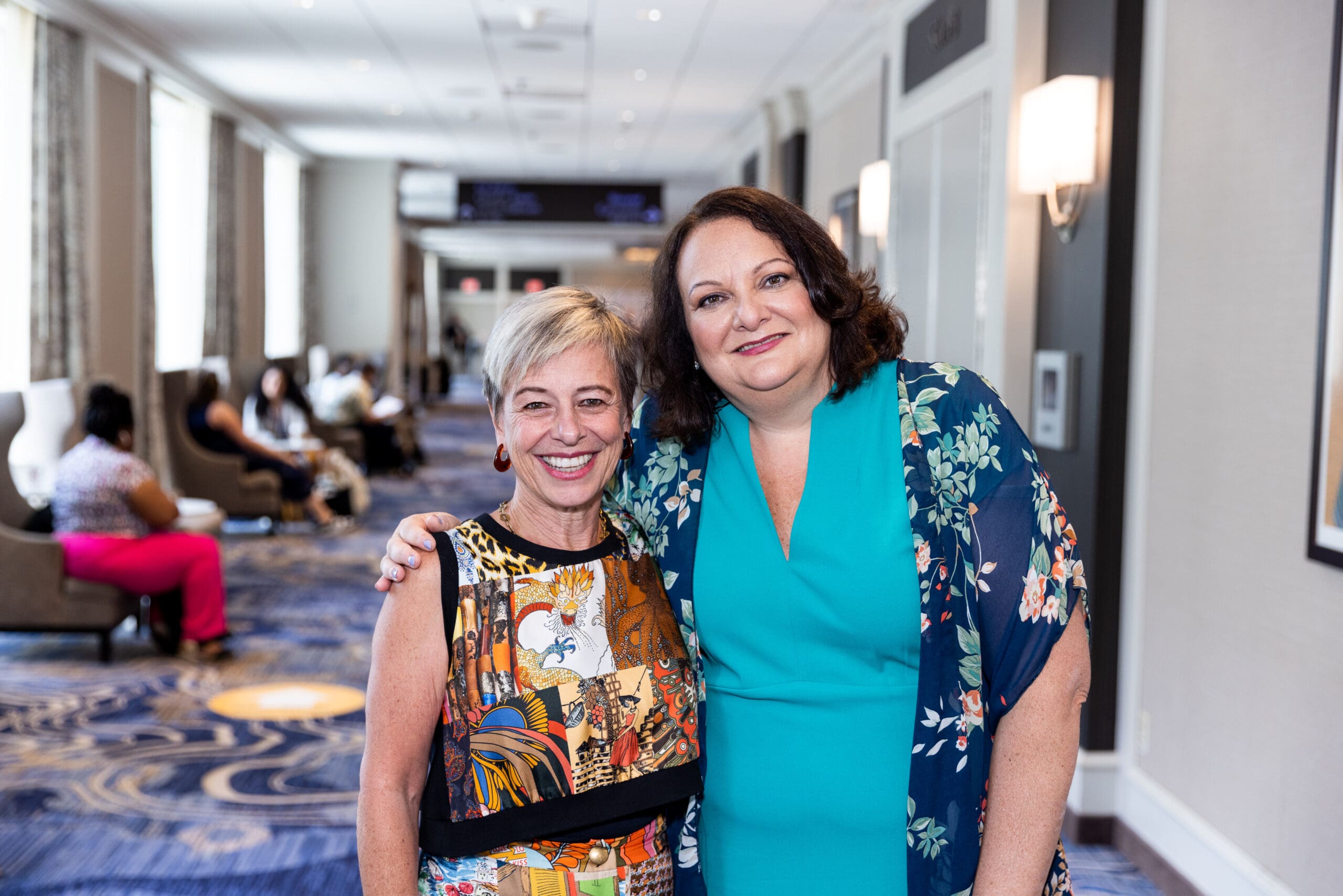
Three Principles for the Past and the Future of Work
At A Glance
JFF’s cofounder Hilary Pennington on 40 years of progress, and the challenges ahead.

It’s no secret that the world has radically changed since Jobs for the Future (JFF) was founded in 1983, and JFF itself is a powerful example of these shifts. Forty years ago, JFF was two people—me and my dear late colleague Arthur White, crisscrossing the state of Connecticut in a car to get employers, state governments, and educational institutions to talk to each other about what workers and learners needed to be successful. Today, JFF is more than 350 people in 46 states, with more than 1,000 partners across the learn-and-work ecosystem, accelerating the kind of transformation we couldn’t have even imagined.
But as we close out JFF’s 40th anniversary year, it is striking to note how many of the problems we set out to solve in that car remain pervasive today. Our systems still don’t talk to each other enough. The pathway to a quality job remains unclear for too many. Truth be told, while together we have made progress, we still have a long way to go. We have not moved far enough, fast enough, toward a truly equitable and adaptive society in which all people can achieve their fullest potential.

Nonetheless, I am optimistic that together we will reach JFF’s ambitious North Star, that in 10 years, 75 million people facing systemic barriers to advancement will work in quality jobs. At the very beginning, when Arthur and I found kindred spirits in each other who shared a dream of an organization that would look to the future, analyze the changing nature of work, and put together the connections and innovations that would help people thrive, we centered JFF around three foundational principles: people, platforms, and partnerships. I’m proud to say that those core ideas not only shaped the early work that put us on the map, but remain at the center of JFF today, and its reputation as a trusted convener, thought leader, and advocate for a future that works—for everyone.
Always center people
JFF put individuals at the heart of its work—asking, what are the things that learners and workers need to make their lives better, and what are the systems and structures getting in the way of that? Access to quality jobs has always been important, yet a longstanding challenge has been inequitable access to postsecondary education and degree requirements where they are unnecessary. One of JFF’s first big breakthroughs took place at president-elect Bill Clinton’s 1992 economic summit in Little Rock, Arkansas, where I was invited to speak about youth apprenticeship and early-career earn-and-learn opportunities. I started my talk by asking the people in the room to raise their hand if they had a four-year postsecondary degree. Of course, the majority raised their hands, and it was a powerful visual moment, because it highlighted that while these leaders all had this degree, the majority of people living in the United States did not.
That contrast—between the leaders in the room who had degrees, and the majority of the country’s learners and workers—shaped JFF’s work, then and now. From our emphasis on early college high school programs to today’s powerful work in credential navigation and the skills-based hiring movement, JFF has never been afraid to discuss how the predominant narratives of success and achievement block access to opportunity, and elevate trusted new pathways—many of which do not require a degree—that lead to economic advancement for all.
A home base for systems innovators
From our earliest days, we envisioned JFF as a home base for innovators—for people who had an instinct that we could do things differently in K-12 and higher education systems, but didn’t know how to find each other. We wanted to offer a sense of community and movement-building and exposure to cutting-edge ideas and strategies.

JFF Cofounder Hilary Pennington with President and CEO Maria Flynn.
Photo by Drew Bird.
It’s exciting to see how that vision has become our reality, from the Horizons summit, which brings 1,800 people together each year to collaborate and elevate solutions, to our powerful networks and coalitions like the Student Success Center Network, the Impact Employer action collaboratives, and more. Changemakers know that when you are seeking connection and ideas that lead to systems transformation, you go to JFF—exactly what we imagined at the beginning.
The power of partnership
Nothing JFF has accomplished in the past 40 years was done alone. That’s why I’m so inspired by how partnership is woven into JFF’s North Star goal for the years ahead. From our earliest funders at Pew Charitable Trust and Atlantic Philanthropies to the bipartisan group of governors we worked with in six states, JFF has always been able to look beyond our divisions and find common ground in the goal of equitable economic advancement for all.
We’re in a moment of great polarization and division, when it seems hard to find a common goal. At the same time, the need to dismantle barriers and change our systems so that more people can have a quality job and a quality life has never been more urgent. It’s time, as JFF’s president and CEO Maria Flynn said at last year’s Horizons, for bold action and big swings. As we celebrate 40 years of collaboration and partnership, I look forward to seeing how JFF will build bridges, cross divides, and bring people together to take the big swings we need.
Hilary Pennington cofounded Jobs for the Future with Arthur White in 1983 and served as CEO for 21 years. She is now executive vice president of programs at the Ford Foundation.